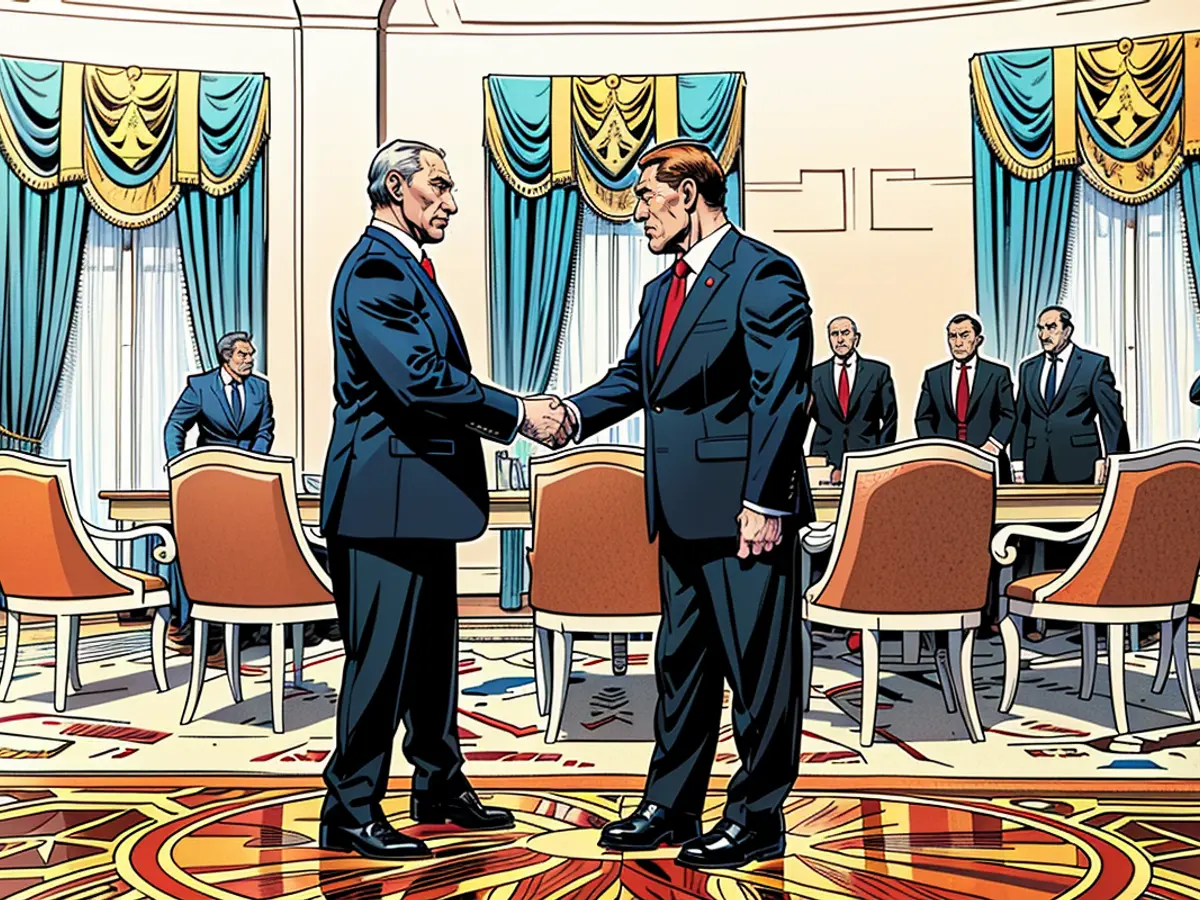Russian leader Putin and second-in-command Chinese official commend strengthening relationship as Ukraine conflict persists.
Chatting with Chinese Vice Premiers Li, Putin mentioned that substantial cooperative ventures between Russia and China in economic and humanitarian sectors will persist for many years, as per the Kremlin's report.
Li, positioned as China's second-in-command under Xi Jinping, journeyed to Moscow for an established annual meeting with Russia's prime minister, concentrating on economic and practical alliances as Russia seeks economic assistance from China amid its ongoing conflict with Ukraine.
In conversation with Putin, Li appreciated the initiatives taken by Putin and Xi to drive forward "full-strength growth" in "Sino-Russian relations and cooperation," according to the Chinese state media.
Li's excursion, comprising a stopover in Belarus, marks the first appearance of a high-level Chinese delegate in Russia since the Kremlin confronted a sudden, prolonged military incursion by Ukrainian forces into the border region of Kursk two months back.
Russia has been striving to dislodge this incursion, marking the first instance of foreign troops breaching Russian territory since World War II and occurring amid mounting pressure for a settlement in the Ukraine conflict, which commenced in 2022 with Russia's comprehensive invasion of Ukraine.
Since the onset of the conflict, the Kremlin has turned increasingly dependent on China's markets, products, and investment, following the imposition of sweeping international sanctions against Russia. Both nations, recognizing each other as pivotal counterweights against the perceived suppression by the West, regard one another as essential partners.
During his meeting with Russian Prime Minister Mikhail Mishustin, Li indicated China's willingness to fortify "comprehensive mutual cooperation" and underscored that their relationship did not target any third party.
Mishustin and Li agreed to amplify bilateral economic and trade ties and promised to defy any endeavor to curb their "economic development, technological improvements, and international advancement," as conveyed by Chinese state media.
Citing "specific countries," the two officials criticized the "obstruction of the collective upward trajectory of emerging markets and developing countries," employing conventional terminology to condemn the United States and its allies.
The meeting report from the Chinese Foreign Ministry omitted any mention of the Ukraine conflict.
Addressing Mishustin, Li pointed out that both Russia and China are confronting a "difficult abroad scenario" as Western nations enforce "unjust sanctions under flimsy pretexts" and strive to "restrain Russia and China's economic and technological potential."
"Given these circumstances, it is significant to channel our energies towards safeguarding our shared interests, fostering a multipolar global order, and strengthening collaboration on international platforms," he stated, according to Russian state media.
Record trade levels
Beijing has been subject to heightened scrutiny and pressure from the West to restrict exports of "doubly effective goods" such as aerospace, manufacturing, and technology equipment to Russia, which Western leaders and Kyiv allege are bolstering the Russian war effort.
Chinese officials have attempted to depict China as a neutral, aspiring mediator in the conflict, while maintaining close ties with Moscow through trade, diplomacy, and security.
China held conversations with a senior Ukrainian official for the first time since Russia's invasion of Ukraine almost three years ago last month.
In response to queries regarding the situation in Kursk, a spokesperson for China's Foreign Ministry advised "all parties" to cease expanding the conflict area, escalating hostilities, and "fanning the flames," stating that China would continue working towards a "political resolution of the crisis."
Wednesday's meeting between Li and Mishustin represents the continuation of annual discussions initiated in 1996, generally focusing on economic, cultural, and humanitarian cooperation and serving to instantiate broader policy objectives set by Xi and Putin.
Post the talks, the two nations signed numerous cooperation agreements in areas such as scientific research, chemical industry, maritime search and rescue, and cross-border cargo transport, as reported by Chinese state media.
Trade between China and Russia reached unprecedented levels last year, surpassing the $240 billion target ahead of schedule. Russia has come to depend heavily on China's market, products, and investment since it was hit with extensive international sanctions following its Ukraine invasion.
Trade increased by more than a quarter year-on-year in 2023 compared to 2022, but has only grown by approximately 1.6% between January and July this year, according to Chinese customs data.
Li is scheduled to wrap up his four-day trip in Belarus, where he will engage in an in-depth conversation with Belarusian Prime Minister Roman Golovchenko regarding bilateral relations and cooperation in various sectors, as suggested by China's Foreign Ministry.
This account has been updated with additional details.
Europe is a region that has been closely watching the escalating tensions between Russia and Ukraine, as the conflict between the two nations has had impacts on international relations.
While facing economic challenges due to international sanctions, Russia has sought to strengthen its partnership with China, which is seen as a crucial partner in the face of perceived suppression by the West on the world stage.







